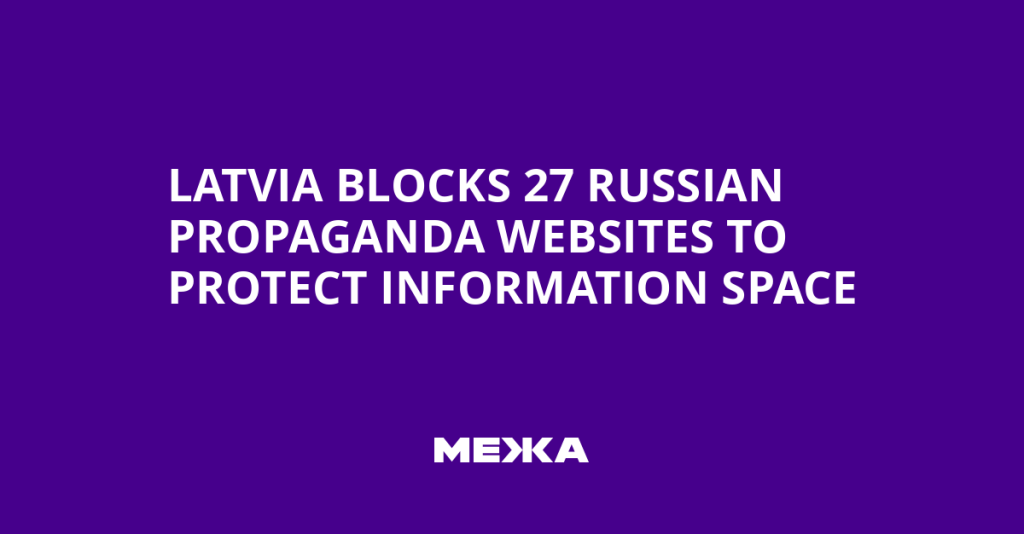Listen to the article
Latvian authorities have blocked access to 27 additional websites identified as spreading Russian propaganda, continuing efforts to safeguard the nation’s information environment amid ongoing regional tensions.
The National Council for Electronic Mass Media (NEPLP) implemented the restrictions following a request from Latvia’s State Security Service, according to reports from LSM and Ukrinform.
Among the newly blocked resources are regional Russian news websites, including gra.ru, tagilcity.ru, donnews.ru, and several other information portals with geographical ties to various Russian regions. The comprehensive list includes sites from Siberia, Crimea, Chukotka, and several Russian border areas.
The decision comes in response to concerns about content that Latvian authorities determined presents a biased narrative regarding the war in Ukraine. The NEPLP specifically cited materials that undermine public support for Ukrainian forces while fostering positive attitudes toward the Russian Federation.
“These resources consistently present one-sided information that attempts to legitimize Russia’s claims over occupied Ukrainian territories,” a security official familiar with the matter explained. “Such narratives pose a significant risk to our information security.”
Particularly troubling to Latvian authorities were materials promoting narratives that challenge Ukraine’s historical legitimacy and the legal status of its territories – positions that align with Russian government talking points used to justify military actions since 2014.
The NEPLP emphasized that such content could have detrimental effects on Latvian society, potentially undermining social cohesion, interethnic relations, and public support for Ukraine’s independence and territorial integrity.
“Information warfare remains a critical component of Russia’s hybrid operations in the Baltic region,” said Ivars Āboliņš, chairman of the NEPLP, in a previous statement on similar actions. “We must remain vigilant in protecting our citizens from coordinated disinformation campaigns.”
This latest action follows a similar decision in September when the NEPLP restricted access to twelve other websites identified as spreading Russian propaganda. The combined efforts represent Latvia’s increasingly assertive stance against what it perceives as information threats originating from Russia.
Latvia, which shares a border with Russia and has a significant Russian-speaking population, has been particularly proactive in implementing measures to counter foreign disinformation. The Baltic nation has consistently expressed concerns about Russian influence operations targeting its information space since Russia’s annexation of Crimea in 2014.
Media analysts note that the blocked websites represent a mix of mainstream Russian regional news outlets and specialized information portals that typically present news from a perspective aligned with Russian state interests.
“This represents the ongoing evolution of Latvia’s defensive posture in the information domain,” said Dr. Jānis Bērziņš, a security expert at the National Defence Academy of Latvia. “What we’re seeing is a recognition that information security is as vital as physical security in today’s geopolitical environment.”
The restrictions align with broader European Union efforts to counter disinformation, though Latvia’s approach has been more direct than some other EU member states. The NEPLP’s decision is consistent with Latvia’s national security strategy, which identifies information warfare as a significant threat.
Internet service providers in Latvia are now required to implement technical measures preventing access to these websites from within the country, though technical workarounds like VPNs remain available to determined users.
The NEPLP has indicated it will continue monitoring the information environment and may take further actions as necessary to protect Latvia’s information space from what it considers harmful foreign influence.
Fact Checker
Verify the accuracy of this article using The Disinformation Commission analysis and real-time sources.




13 Comments
Decisive action to limit the spread of Russian propaganda is understandable given the regional tensions. However, I hope Latvia is carefully considering the long-term implications and potential unintended consequences of these website blocks.
Good point. Maintaining an open and resilient information environment is crucial, even as governments work to counter specific disinformation campaigns.
Appreciate Latvia’s proactive stance in defending its information space. Blocking known propaganda outlets is a sensible step, though the long-term solution requires building public resilience to such manipulation.
Agreed. Empowering citizens to critically evaluate information sources is crucial, alongside targeted content moderation measures.
While restricting access to propaganda websites may be a necessary measure, it’s a fine line between safeguarding information and outright censorship. I hope Latvia is carefully balancing these concerns to uphold democratic principles.
That’s a valid point. Maintaining an open information environment while guarding against malign influence is challenging. Ongoing public dialogue and oversight will be key.
Limiting access to Russian propaganda websites is understandable, but I hope Latvia is maintaining transparency around the criteria used and providing avenues for appeal. Balancing security and free expression is always a delicate challenge.
Exactly. Oversight and accountability mechanisms will be important to ensure these measures don’t overstep legitimate bounds of content moderation.
Glad to see Latvia taking steps to limit the spread of Russian propaganda within their borders. Misinformation can be a real threat to national security and public discourse. Curious to learn more about the specific criteria used to identify these websites as propagandistic.
Yes, a robust process for vetting and blocking propaganda sources is important. Transparency around the evaluation methodology could help build public trust in these efforts.
While I’m sympathetic to Latvia’s goal of safeguarding its information space, I’m curious to know if there are any concerns that this could backfire and drive more Latvians to seek out the blocked content via VPNs or other means.
Curious to know if these blocked sites were the primary sources of Russian propaganda in Latvia, or just the tip of the iceberg. Likely an ongoing battle to identify and counter disinformation campaigns.
This seems like a reasonable move by Latvian authorities to protect their information environment. However, I wonder if there are concerns about setting a precedent that could be abused to censor legitimate, if unpopular, viewpoints.